High school basketball scoring records represent the pinnacle of individual offensive achievement in competitive prep basketball—benchmarks that define program excellence, inspire current players, and create lasting legacies that connect generations of athletes. From career scoring milestones like the prestigious 1,000-point club to single-game eruptions that shatter expectations, scoring records tell the stories of exceptional talent, relentless dedication, and unforgettable performances that become permanent parts of school athletic history.
Yet many high schools struggle to effectively track, document, and celebrate their basketball scoring records. Paper record boards deteriorate and become outdated, statistical records remain scattered across filing cabinets and old programs, historical achievements get lost during facility renovations, and current players lack awareness of the standards set by program legends. Meanwhile, record-breaking performances deserve immediate recognition and permanent documentation that traditional static displays simply cannot provide.
This comprehensive guide explores everything athletic directors, coaches, and school administrators need to know about high school basketball scoring records—from understanding different record categories and tracking systems to implementing modern digital recognition solutions that preserve excellence while inspiring future generations to pursue their own place in program history.
Basketball scoring records matter because they provide tangible measures of individual excellence, create aspirational goals for developing players, strengthen program traditions, and build connections between alumni record-holders and current teams. Schools that excel at documenting and celebrating scoring achievements create cultures of excellence where records inspire rather than intimidate, and where every achievement receives the lasting recognition it deserves.
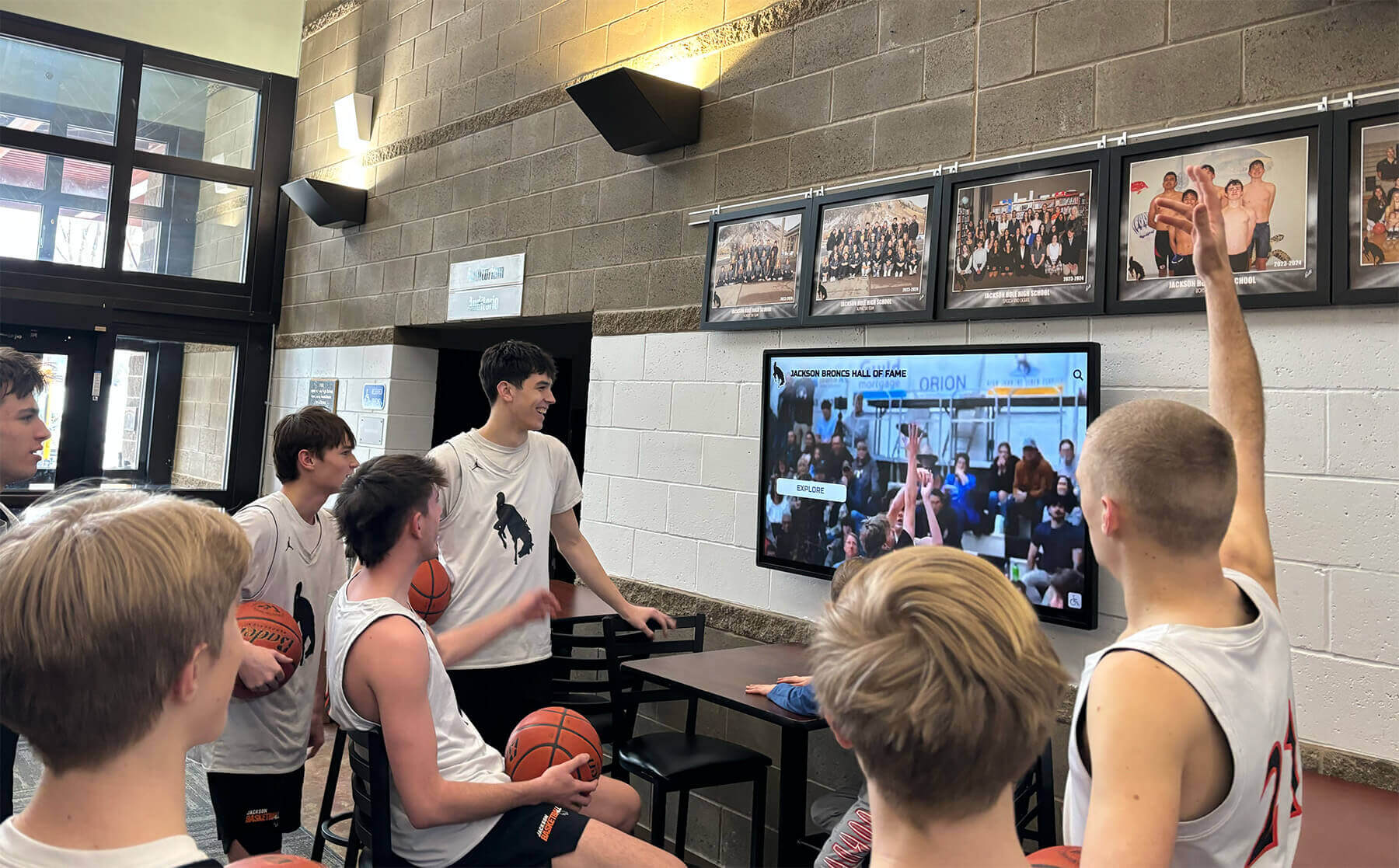
Modern digital displays bring basketball achievements to life for current players through interactive content and engaging multimedia
Understanding High School Basketball Scoring Records Categories
Basketball scoring records span multiple categories, each representing different types of excellence and requiring distinct documentation approaches.
Career Scoring Records
Career scoring represents the most prestigious category in high school basketball record-keeping:
The 1,000-Point Club
Reaching 1,000 career points has long served as basketball’s definitive benchmark for scoring excellence. This milestone typically requires sustained production across multiple varsity seasons, with players averaging 12-15 points per game over three to four years. According to MaxPreps national record data, all players in the top 100 career scorers scored at least 3,000 points, with Louisiana producing 20 players on that elite list.
The 1,000-point milestone remains relatively rare despite increasing achievement frequency. It demonstrates not just scoring ability but also durability, consistency, and commitment to program excellence across multiple years. Schools should celebrate all 1,000-point scorers while potentially creating additional recognition tiers for exceptional achievers reaching 1,500, 2,000, or higher milestones.
Career Scoring Leaderboards
Programs should maintain comprehensive career scoring lists documenting:
- All-time career scoring leaders ranked by total points
- Gender-specific leaderboards for boys and girls basketball
- Points-per-game career averages for minimum games played
- Career field goals made and shooting percentages
- Three-point shooting career totals
- Free throw career makes and percentages
Learn more about comprehensive 1,000 points scorer recognition programs that properly honor career scoring excellence.
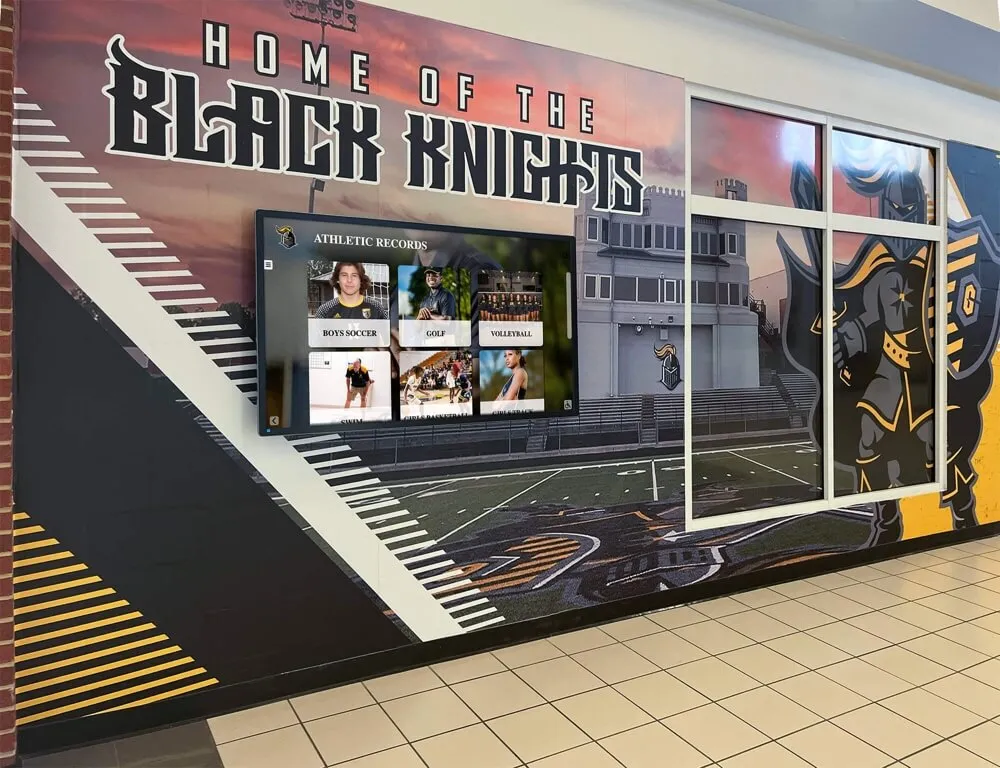
Digital record displays provide prominent visibility for career scoring achievements in high-traffic athletic areas
Single-Game Scoring Records
Individual game performances create memorable moments in program history:
Exceptional Single-Game Achievements
According to MaxPreps historical data, Herman “Suz” Sayger holds Indiana’s single-game record with 113 points scored for Culver versus Winamac on March 8, 1913. While modern game conditions differ significantly from early 20th-century basketball, single-game records document exceptional individual performances under specific game contexts.
More contemporary single-game achievements provide relevant benchmarks:
- 50-point games representing elite single-game performances
- 40-point games showing exceptional offensive production
- Double-doubles combining scoring with rebounding or assists
- Perfect shooting performances with high scoring totals
- Clutch performances in championship or rivalry games
Schools should document not just the points total but the game context—opponent, final score, date, tournament round, and significance within season—that makes each performance meaningful.
Recording Single-Game Details
Comprehensive single-game record documentation should include:
- Points scored with field goals, three-pointers, and free throws breakdown
- Shooting percentages across all categories
- Additional statistical categories (rebounds, assists, steals)
- Game outcome and final score
- Opponent and competition level
- Date and season context
- Available game footage or highlight videos
- Newspaper coverage and contemporary game reports
Season Scoring Records
Single-season achievements demonstrate sustained excellence across complete campaigns:
Total Points in a Season
According to CBSSports tracking of high school basketball, multiple players have exceeded 1,400 points in a single season, with one player breaking his own record by scoring 1,450 points in a season. Season scoring records depend on several factors including number of games played, team pace of play, player role within offensive system, and competition level.
Schools should maintain separate season records accounting for:
- Different eras with varying season lengths
- Pre-three-point era versus modern three-point shooting
- Different competition classifications and conferences
- Playoff and tournament games versus regular season only
Points Per Game Seasonal Averages
Season scoring averages provide normalized comparisons across different season lengths:
- Season points-per-game leaders by year
- Minimum games played qualifications (typically 15-20 games)
- Shooting efficiency metrics alongside scoring averages
- Freshman, sophomore, junior, and senior season records
- Single-season three-point shooting records
Discover comprehensive approaches to finding school sports records across all achievement categories.
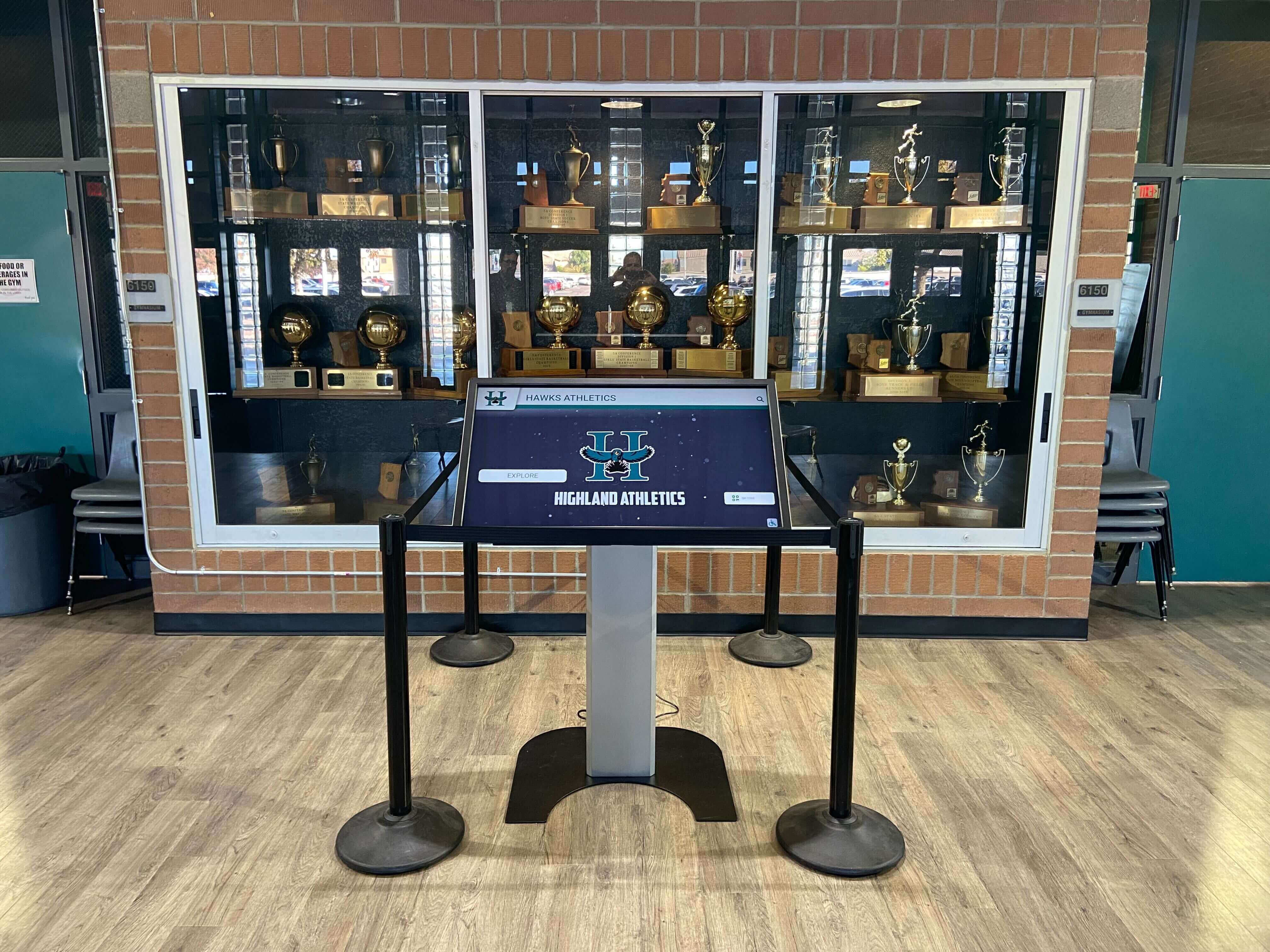
Digital systems replace or complement traditional trophy cases while providing unlimited capacity for documenting scoring records
Tracking and Documenting Basketball Scoring Records
Systematic tracking ensures accuracy and comprehensiveness in basketball record-keeping.
Establishing Official Record-Keeping Systems
Effective record tracking begins with clear protocols and designated responsibilities:
Defining Official Records Criteria
Schools must establish standards determining what constitutes an official school record:
- Varsity games only versus inclusion of junior varsity statistics
- Regular season and playoffs versus postseason tournaments only
- Home scorer versus official state association statistics
- Minimum playing time or game participation requirements
- Documentation and verification standards for historical records
- Procedures for resolving statistical discrepancies
Assigning Record-Keeping Responsibilities
Clear organizational structures ensure consistent record maintenance:
- Head coach oversight and statistical validation
- Team statistician or manager game-by-game tracking
- Athletic director annual record verification
- Sports information coordinator public record updates
- Backup systems protecting against information loss
- Succession planning for administrative transitions
Season-Long Statistical Tracking
Contemporary season tracking provides real-time record monitoring:
Game-by-Game Statistics Management
Modern basketball requires comprehensive statistical tracking:
- Official scorebook maintenance with detailed play-by-play
- Digital statistical software capturing advanced metrics
- Game film breakdown for verification and context
- Running career total updates throughout seasons
- Record proximity tracking for players approaching milestones
- Communication protocols alerting administration to potential records
Integration with National Platforms
External platforms enhance record documentation:
- MaxPreps team pages with comprehensive statistics
- State association statistical databases and leaderboards
- Conference statistical tracking and recognition
- Media outlets covering high school basketball
- College recruiting platforms documenting performance
Schools implementing comprehensive athletic recognition programs understand the importance of systematic documentation across all achievement categories.
Historical Record Research and Verification
Documenting complete program history requires systematic historical investigation:
Primary Source Documentation
Research historical scoring records through:
- School yearbook season summaries and team photos
- Newspaper archives with game coverage and box scores
- Athletic department filing cabinets and record books
- Media guides and championship program booklets
- State association tournament results and statistics
- Alumni interviews and institutional memory

Interactive displays make exploring historical records engaging for students, alumni, and visitors
Cross-Referencing Multiple Sources
Verification requires comparing multiple documentation sources:
- Compare yearbook statistics with newspaper reports
- Cross-reference alumni recollections with documented evidence
- Verify state tournament statistics through official records
- Account for statistical standards changing over time
- Document uncertainties and conflicting information transparently
- Establish “best available information” when complete verification proves impossible
Recognizing and Celebrating Scoring Record Achievements
Meaningful recognition honors individual excellence while inspiring future achievement.
Immediate Recognition for Record-Breaking Performances
When athletes break scoring records, immediate acknowledgment creates memorable moments:
In-Game Recognition Protocols
Real-time record celebration during games:
- Public address announcement when records are broken
- Video board recognition during natural game stoppages
- Post-game acknowledgment during team huddles
- Commemorative game ball presentation
- Social media posts immediately following games
- Locker room celebration and team recognition
Post-Game and Next-Day Recognition
Extended celebration following record performances:
- Press releases distributed to local and regional media
- School-wide announcements and newsletter features
- Athletic department website homepage features
- Social media content with photos, videos, and statistics
- Display updates within 24-48 hours documenting new records
- Communication to alumni and booster organizations
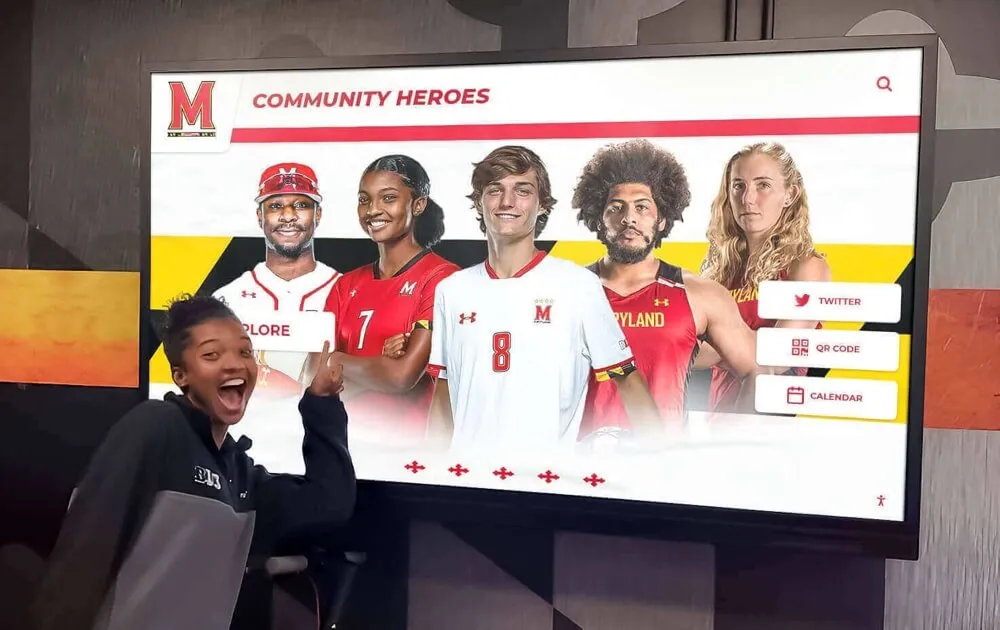
Digital recognition creates engaging touchpoints where students interact with athletic excellence regularly
Milestone Recognition Ceremonies
Formal ceremonies honor career achievement milestones:
1,000-Point Club Induction Ceremonies
Special recognition when athletes reach career scoring milestones:
- Halftime ceremonies during home games with family participation
- Presentation of commemorative basketballs or awards
- Coach testimonials highlighting achievement and character
- Video tribute featuring career highlights and memorable moments
- Recognition from athletic directors and school administrators
- Photo opportunities documenting milestone celebrations
- Permanent addition to digital and physical recognition displays
End-of-Season Recognition Events
Annual athletic banquets provide additional celebration:
- Special awards for single-season record achievements
- Career milestone acknowledgment for graduating seniors
- Record-breaking performance highlights and video tributes
- Historical context placing achievements within program legacy
- Connection with honor roll recognition programs celebrating academic excellence
Physical Awards and Commemorative Items
Tangible recognition creates lasting personal mementos:
Custom Recognition Items
Traditional awards commemorating scoring achievements:
- Gold basketballs engraved with names, points, and dates
- Plaques documenting career or single-season records
- Framed certificates with achievement details
- Custom jerseys or warmup gear recognizing milestones
- Photo collages celebrating achievement moments
- Personalized items athletes can display at home
Schools implementing comprehensive recognition discover value in combining traditional physical awards with modern digital documentation ensuring both personal mementos and permanent public recognition.
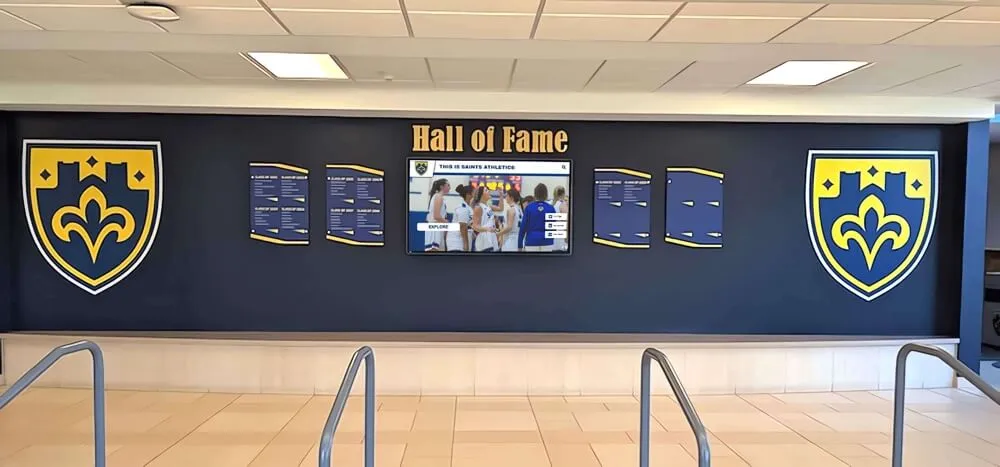
Hybrid recognition approaches preserve traditional aesthetic elements while adding digital capacity
Modern Digital Solutions for Basketball Scoring Records
Digital technology transforms how schools document, display, and celebrate basketball scoring excellence.
Interactive Digital Record Board Systems
Solutions like Rocket Alumni Solutions provide comprehensive platforms specifically designed for athletic record recognition:
Unlimited Recognition Capacity
Digital systems eliminate the fundamental space constraints limiting traditional record boards:
- Single display showcases unlimited scoring records across program history
- Complete career statistics and biographical information for every record holder
- No need to remove historical records to accommodate new achievements
- Comprehensive archives documenting decades of basketball excellence
- Subject-specific categories organizing boys and girls basketball separately
- Recognition capacity growing infinitely as programs add achievements
Rich Multimedia Storytelling
Interactive displays bring records to life through comprehensive content:
- High-resolution action photos from games and career highlights
- Video clips of record-breaking performances and milestone moments
- Complete career statistics including season-by-season progressions
- Biographical information about athletes’ backgrounds and journeys
- Post-graduation updates documenting college and professional careers
- Coach quotes and testimonials about record-holding athletes
Engaging Interactive Features
Touchscreen functionality transforms passive viewing into active exploration:
- Search capabilities enabling visitors to find specific players instantly
- Filtering by decade, gender, record category, or point totals
- Detailed profile pages telling complete achievement stories
- Photo galleries documenting athletes across multiple seasons
- Comparison features showing where scorers rank in program history
- Statistical leaderboards highlighting all-time offensive performers
Learn more about comprehensive basketball hall of fame recognition systems that can accommodate scoring records alongside other program honors.
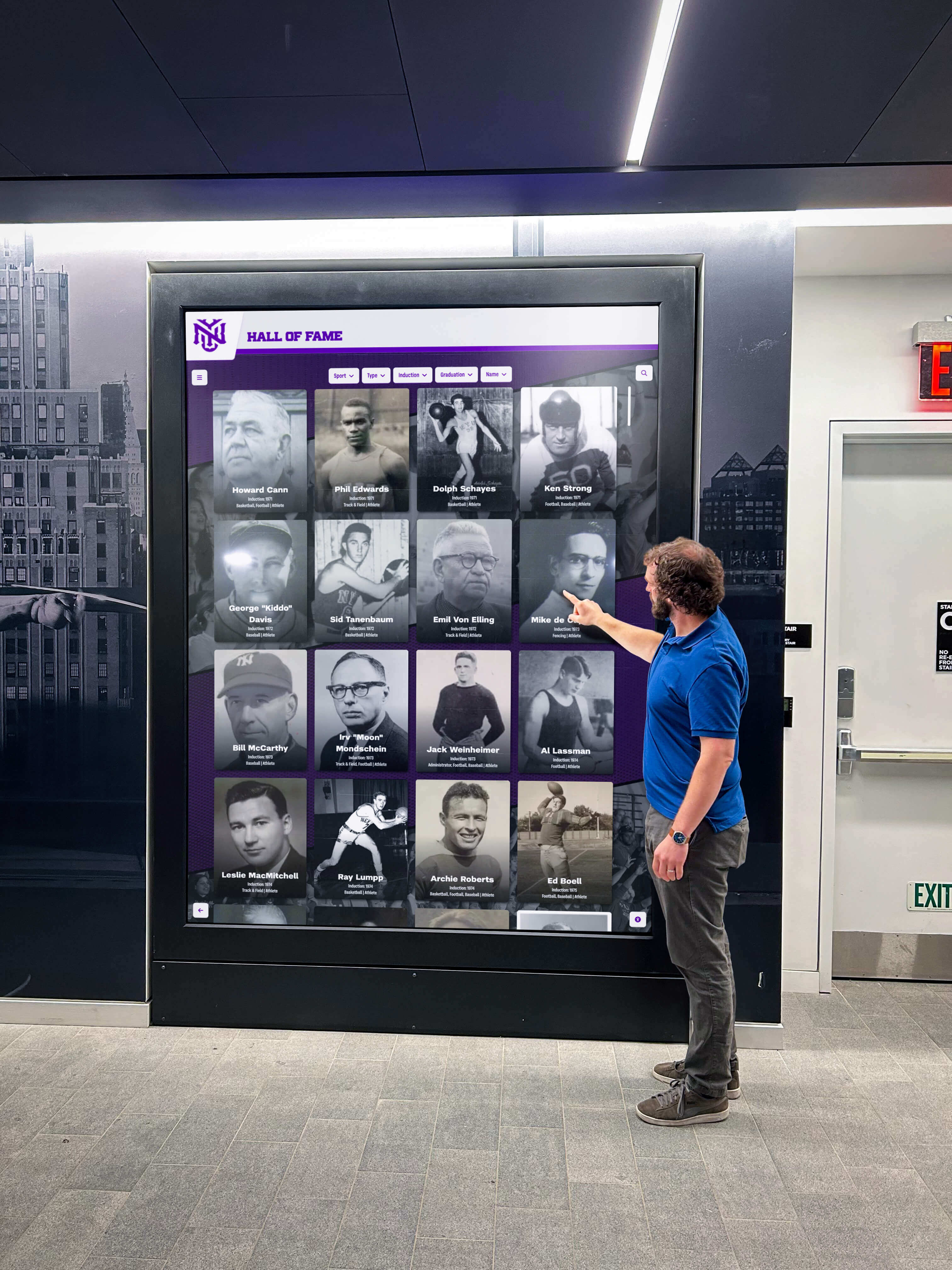
Digital platforms transform record displays into engaging destinations where visitors actively explore basketball history
Real-Time Updates and Easy Management
Modern digital systems eliminate traditional update challenges:
Instant Record Updates
Digital platforms enable immediate record documentation:
- Update records within minutes of achievement verification
- Remote management from any internet-connected device
- No need for physical access to displays for content changes
- Scheduled updates for seasonal records and championships
- Multiple administrators managing content with appropriate permissions
- Version control tracking all changes and updates
Simple Content Management
Cloud-based systems eliminate technical barriers:
- Intuitive interfaces requiring no specialized technical expertise
- Template systems ensuring consistent presentation across all records
- Bulk import tools for historical record data migration
- Drag-and-drop media management for photos and videos
- Role-based permissions enabling appropriate staff access
- Comprehensive training and ongoing support from providers
Schools report 70-85 percent reduction in time spent managing athletic records after implementing digital systems compared to maintaining traditional physical record boards.
Web-Based Record Access and Sharing
Digital recognition extends beyond physical display locations:
Online Record Portals
Web-accessible platforms amplify recognition reach:
- Complete scoring record databases accessible worldwide
- Alumni and families viewing records from any location
- Mobile-optimized displays ensuring smartphone accessibility
- Social sharing capabilities enabling athletes to celebrate achievements
- Integration with school athletic websites and media platforms
- Search engine visibility increasing program exposure and reputation
Multi-Channel Communication Integration
Systematic communication ensures maximum achievement visibility:
- Email announcements when scoring records are established
- Social media posts celebrating record holders with statistics
- Newsletter features highlighting recent achievements
- Athletic website homepage features for major milestones
- Alumni network communications connecting graduates with current records
- Press release distribution to local and regional media outlets
Explore digital record board systems that provide comprehensive basketball scoring record management.

Prominent digital displays create focal points in athletic facilities where records receive constant visibility
Strategic Display Placement for Maximum Impact
Thoughtful installation locations maximize record visibility and engagement.
Primary Athletic Facility Locations
High-traffic areas ensure records receive consistent viewing:
Gymnasium and Arena Placements
Optimal locations within basketball facilities:
- Main gymnasium entrance lobbies where all visitors pass
- Concourse areas near court entrances and concessions
- Locker room hallway areas viewed daily by athletes
- Athletic department offices and administrative spaces
- Weight room or training facility entrances
- Practice gymnasium lobbies for daily team exposure
Visibility Optimization Strategies
Technical considerations maximizing engagement:
- Eye-level mounting at appropriate viewing heights (48-60 inches to center)
- Adequate spacing preventing crowding or obstruction
- Lighting considerations avoiding screen glare
- Attract loop content drawing attention from distance
- Clear signage directing visitors to recognition displays
- Multiple displays in large facilities ensuring comprehensive coverage
Secondary Campus Locations
Extended visibility beyond athletic-specific areas:
Whole-School Recognition Opportunities
Expanding record visibility school-wide:
- Main school entrance lobbies reaching all students and visitors
- Library or commons areas where students gather daily
- Administrative office waiting areas for parent and visitor viewing
- Alumni center spaces dedicated to graduate engagement
- Special event venues for banquet and ceremony settings
Schools implementing state championship trophy case displays discover that strategic placement throughout facilities creates comprehensive athletic recognition environments.
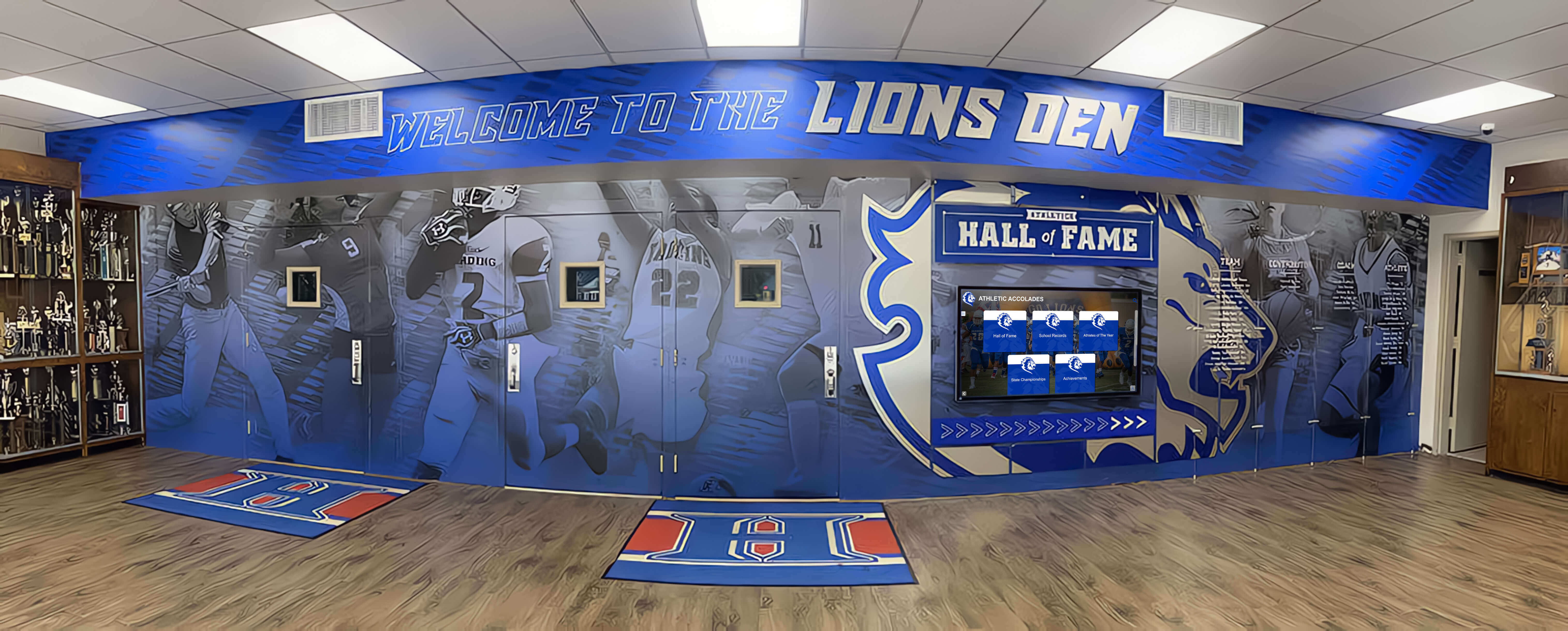
Integrated recognition spaces combine digital displays with traditional elements creating impressive athletic celebration environments
Building Record Recognition into Program Culture
Effective programs integrate record recognition into daily team culture.
Creating Aspirational Environment for Current Players
Visible records inspire developing athletes:
Record Awareness Programs
Systematic initiatives building record consciousness:
- Display records prominently in practice facilities and locker rooms
- Share record progressions during season team meetings
- Recognize players approaching records in real-time
- Create “record watch” communications as milestones approach
- Connect current athletes with record-holding alumni
- Use records to set individual and team performance goals
Performance Context and Historical Connection
Help athletes understand record significance:
- Share stories behind record-setting performances
- Document challenges record-holders overcame
- Highlight team success surrounding individual achievements
- Explain how records fit within program history
- Compare current statistics to historical benchmarks
- Build relationships between current players and alumni record-holders
Recruiting Advantages Through Record Recognition
Comprehensive record systems attract prospective athletes:
Showcasing Program Excellence
Records demonstrate sustained competitive success:
- Professional record displays signal program commitment to recognition
- Historical excellence evidence showing tradition of achievement
- Technology-forward approach appealing to contemporary recruits
- Alumni success stories providing aspirational examples
- Family appeal through promises of lasting recognition
- Competitive differentiation versus programs lacking comprehensive systems
Discover how digital trophy touch walls create impressive environments that influence recruiting conversations.

Impressive record displays create talking points during facility tours with recruits and their families
Alumni Engagement Through Scoring Records
Record recognition strengthens lifelong program connections:
Alumni Record-Holder Recognition
Systematic engagement with scoring record alumni:
- Feature record-holding alumni prominently in displays
- Contact record holders when records are approached or broken
- Create comprehensive alumni profiles with career and life updates
- Invite record holders to games and athletic events
- Share historical records through alumni communications
- Develop mentorship connections between alumni and current players
Multi-Generational Legacy Recognition
Celebrate family basketball traditions:
- Document family members who all scored 1,000+ points
- Compare statistical achievements across generations
- Create special recognition for multi-generation excellence
- Feature family basketball legacies in display content
- Facilitate connections between family members across eras
Implementation Planning for Digital Record Systems
Successful transitions require systematic planning and execution.
Phase 1: Assessment and Research
Begin with comprehensive evaluation of current systems:
Current Record Documentation Audit
Systematic inventory of existing records:
- Document all physical record boards and current condition
- Compile available statistical records from all sources
- Identify gaps in historical documentation
- Review yearbooks and newspaper archives systematically
- Interview coaches and administrators about record priorities
- Create spreadsheet databases organizing discovered information
Stakeholder Engagement and Requirements
Involve key constituencies in planning:
- Athletic director oversight and administrative approval
- Basketball coaches providing historical knowledge and insights
- Alumni relations connecting with graduated record-holders
- Technology staff ensuring infrastructure support
- Facilities management coordinating display installation
- Development office exploring fundraising opportunities
Phase 2: Platform Selection and Content Development
Choose appropriate technology and prepare content:
Digital Recognition Platform Criteria
Evaluate solutions based on essential features:
- Commercial-grade touchscreen hardware for continuous operation
- Basketball-specific organization templates and layouts
- Intuitive content management requiring minimal technical expertise
- Multimedia support for photos, videos, and rich statistics
- Search and filtering capabilities enabling visitor exploration
- Cloud-based architecture eliminating local server requirements
- Proven track record with educational athletic programs
Implementation Partners
Consider comprehensive solutions like Rocket Alumni Solutions that provide:
- Turnkey hardware and software integrated packages
- Professional design services creating polished presentations
- Content migration assistance for historical achievers
- Training and ongoing support for administrative staff
- Flexible pricing accommodating various budget levels
- Dedicated customer success ensuring program vitality
Content Development Process
Systematic preparation of record documentation:
- Verify all statistical records through cross-referencing
- Collect photographs for every documented record holder
- Write biographical content and achievement narratives
- Create standardized profile templates ensuring consistency
- Digitize historical documents and newspaper clippings
- Produce or acquire video content for major achievements
Phase 3: Installation and Launch
Execute implementation with appropriate fanfare:
Technical Installation
Professional setup ensuring optimal function:
- Mount displays at appropriate heights in optimal locations
- Configure network connectivity and cloud access
- Install content management software and import records
- Test all interactive features and navigation
- Train administrative staff on system management
- Establish backup and maintenance protocols
Launch Event and Communication
Celebrate new recognition system:
- Host unveiling event inviting record-holders and community
- Generate media coverage about enhanced recognition
- Communicate launch through all school channels
- Provide demonstrations teaching community about features
- Gather initial feedback for continuous improvement
Learn about comprehensive approaches to implementing digital walls of fame across school athletic programs.
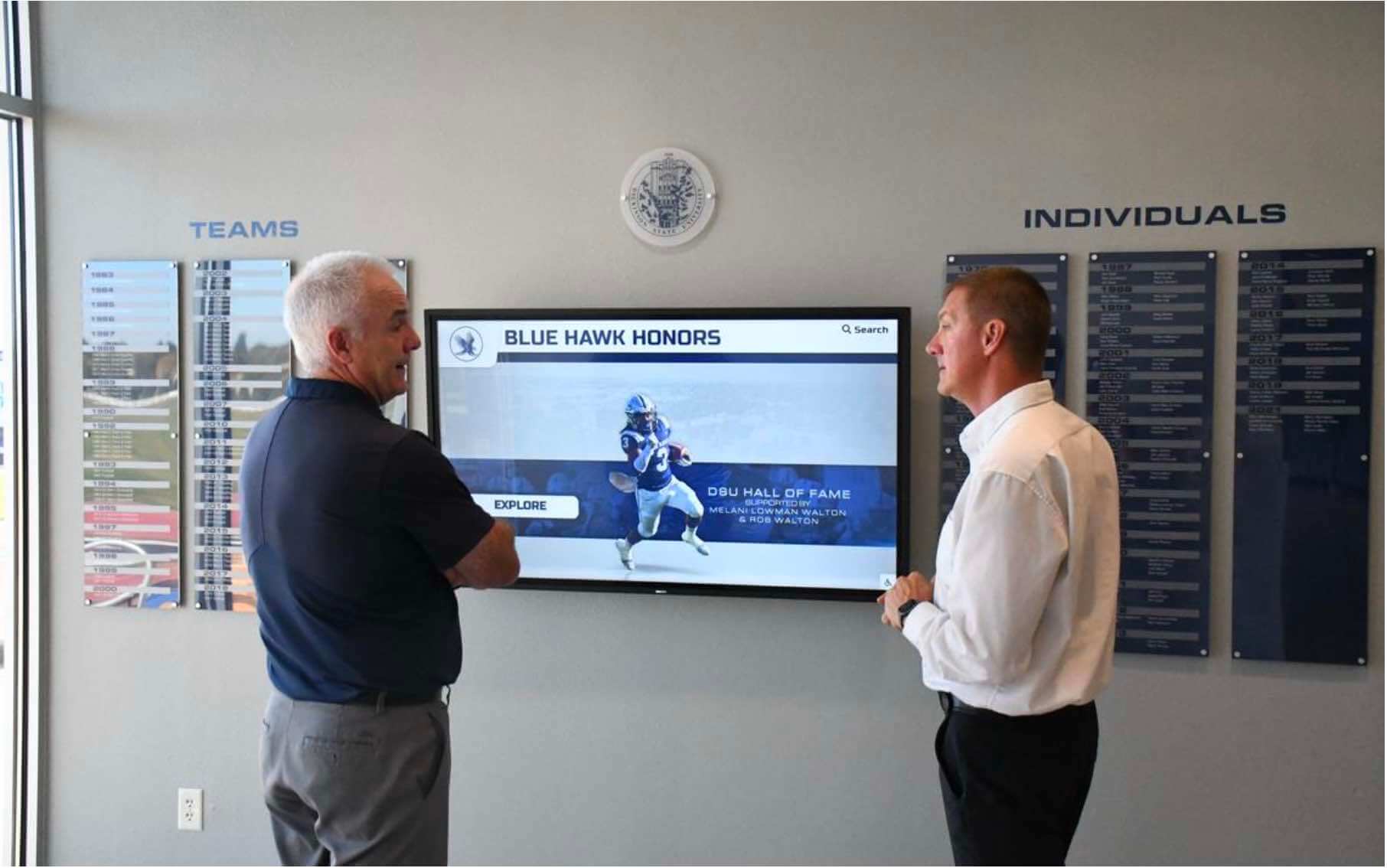
Professional digital installations create impressive focal points that draw engagement from all visitors
Budget Considerations and Funding Strategies
Understanding costs and funding options enables successful implementation.
Program Cost Components
Initial Implementation Investment
One-time costs for system setup:
- Digital display hardware ($3,000-$10,000 per display depending on size)
- Software platform licensing (typically $1,000-$3,000 annually)
- Professional installation ($500-$2,000 depending on complexity)
- Initial content development for historical records
- Design and branding customization
- Launch event expenses
Ongoing Operational Costs
Recurring expenses for system maintenance:
- Annual software platform subscriptions
- Content updates for new record achievements
- Photo and video production for new honorees
- Staff time for program management
- Technology maintenance and technical support
- Periodic hardware upgrades (typically 5-7 year cycles)
Fundraising and Sponsorship Opportunities
Record recognition programs offer natural fundraising themes:
Basketball Alumni Campaigns
Former players funding recognition initiatives:
- Alumni donations naming specific displays or features
- 1,000-point scorer reunion events with fundraising components
- Challenge campaigns matching new achievement recognition
- Legacy giving connecting multi-generation basketball families
- Lifetime membership programs in record recognition societies
Corporate and Community Sponsorship
Business support for athletic recognition:
- Local business sponsorship of display installations
- Athletic booster organization funding and support
- Community foundation grants for athletic recognition
- Corporate naming opportunities for recognition spaces
- In-kind donations of hardware or installation services
Budget-Friendly Implementation Options
Alternatives for programs with limited resources:
- Single display in primary location with future expansion
- Web-based recognition without physical display initially
- Phased historical content development over multiple years
- Student assistance with content creation and management
- Refurbished display hardware reducing upfront costs
Maintaining Long-Term Program Success
Sustained vitality requires ongoing attention and continuous improvement.
Ongoing Content Management
Systematic operations maintain program momentum:
New Record Integration Workflow
When scoring records are established:
- Immediate notification to recognition program manager
- Statistical verification and documentation
- Photo collection from athletic archives and game coverage
- Profile content development following established templates
- Display update within 24-48 hours of achievement
- Ceremony coordination with coaching staff
- Communication distribution announcing accomplishment
Historical Profile Enhancement
Continuously improve existing content:
- Add newly discovered photographs from alumni
- Update post-playing career information for graduates
- Enhance statistical details and achievement context
- Incorporate video content as technology evolves
- Refresh design elements maintaining contemporary appearance
- Correct errors or outdated information discovered
Program Assessment and Evolution
Regular evaluation ensures continued effectiveness:
Success Metrics
Quantitative and qualitative indicators:
- Display interaction rates and engagement duration
- Web traffic to online record portals
- Social media engagement with record announcements
- Alumni satisfaction with recognition approach
- Current athlete awareness of and motivation by records
- Community perception of program excellence
Continuous Enhancement
Based on assessment and feedback:
- Expand record categories documenting additional achievements
- Enhance profile content depth and multimedia richness
- Upgrade technology maintaining contemporary experience
- Improve recognition ceremonies based on stakeholder input
- Develop new engagement opportunities connecting eras
- Integrate with broader athletic achievement recognition programs

Intuitive touch interfaces make exploring scoring records engaging and accessible for all ages
Conclusion: Preserving Basketball Excellence for Future Generations
High school basketball scoring records represent more than statistical achievements—they tell stories of exceptional talent, tireless dedication, unforgettable performances, and the pursuit of excellence that defines competitive athletics. Athletes who establish scoring records through years of practice, countless games, and consistent performance under pressure deserve recognition that matches the magnitude of their accomplishments.
The strategies explored in this guide provide comprehensive frameworks for tracking scoring records accurately, documenting achievements systematically, and celebrating excellence through both traditional ceremonies and modern digital recognition solutions. From establishing clear record-keeping protocols to implementing interactive touchscreen displays that showcase unlimited achievements with rich multimedia storytelling, these approaches transform how schools honor basketball greatness while inspiring current and future players to pursue their own extraordinary performances.
Transform Your Basketball Record Recognition
Discover how modern digital recognition solutions can help you document, display, and celebrate every scoring achievement in your program's history while inspiring future excellence.
Explore Recognition SolutionsDigital recognition platforms like those from Rocket Alumni Solutions enable basketball programs to showcase unlimited scoring records with comprehensive statistical profiles, engaging multimedia content, and interactive exploration capabilities that traditional static record boards simply cannot provide. These modern systems eliminate space constraints, enable instant updates as records fall, and create engaging displays that become destination attractions within athletic facilities while extending recognition online to reach alumni and supporters worldwide.
Whether implementing comprehensive recognition overhauls or enhancing existing systems, success lies in intentional planning that honors individual achievement while serving broader program goals around tradition preservation, player motivation, and alumni engagement. Begin with immediate improvements you can implement now—updating physical record boards, digitizing historical documentation, establishing clear record-keeping protocols—then systematically enhance recognition creating the comprehensive celebration your record-holding athletes deserve.
Your program’s scoring record holders have achieved remarkable milestones through years of dedication, countless practice hours, and consistent excellence under competitive pressure. Their accomplishments deserve recognition that preserves their legacies permanently while inspiring current and future players to pursue similar heights. With systematic tracking, meaningful celebration, appropriate technology investment, and sustained commitment to program vitality, you can create basketball scoring record recognition that honors the past, celebrates the present, and inspires the future of excellence in your program.
Ready to transform how your program recognizes scoring excellence? Explore comprehensive athletic record boards designed specifically for basketball achievement documentation. Learn about school pride building strategies that incorporate record recognition as central cultural elements. Discover digital recognition displays that celebrate athletic excellence alongside academic achievements.
Start documenting and celebrating your basketball scoring records today—your program’s offensive legends deserve celebration equal to their remarkable achievements.




































